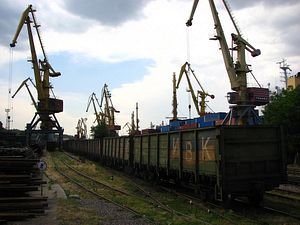Ukraine has been one of Kazakhstan’s top five import partners fairly consistently over the past decade. That trade, however, has been increasingly imperiled by tensions between Europe and Russia, with Ukraine as the crux. Kazakhstan continues to be put in an awkward position between its wider economic interests, its close relationship with Russia, and the (perhaps unintended) consequences of Russia’s trade tussles with Europe.
Russia decided to respond to Ukraine’s entry into an association agreement with the European Union–which includes a free-trade agreement–by revoking Ukraine’s place in the Commonwealth of Independent States free-trade agreement. Further, as I noted last week, Russia said that as a result, all trade from Ukraine to Kazakhstan transiting via Russia must first pass through checkpoints in Belarus.
Ukrainian President Petro Poroshenko spoke via phone to his Kazakh counterpart, Nursultan Nazarbayev recently. According to the Ukrainian readout of the conversation the two discussed the the implementation of agreements signed in October, when Poroshenko visited Astana, and the impact of Russia’s embargo. The summary says that Nazarbayev “confirmed willingness to fulfill the effective bilateral and multilateral agreements with Ukraine in order to prevent any discrimination in Ukrainian-Kazakh trade.”
In October, after the Poroshenko visit, I commented that Kazakhstan’s ambition to be an international player is, in part, predicated on acting independently. “Nazarbayev’s repeated position on the Ukraine-Russia debacle is that the Minsk agreements — which call for a ceasefire, deescalation, and an exit of armed groups from the areas in conflict among other things — should be implemented. Rooting for a peaceful, negotiated settlement is not a controversial position in either Kiev or Moscow. As long as Nazarbayev keeps away from specifics he’s safe — and both Putin and Poroshenko seem happy to let Nazarbayev play the role of intermediary.”
The present issue moves closer to the specifics I said Nazarbayev would stay away from. But the Ukrainian readout does not attribute any potentially inflammatory remarks to Nazarbayev. The closest it comes is this:
Petro Poroshenko emphasized that Russian actions violate the Vienna Convention on the Law of Treaties and respective rules and regulations of the World Trade Organization. In this regard, the Presidents discussed the opportunity of establishing transit of Ukrainian goods in order to prevent Russian adverse effect on the trade turnover between Ukraine and Kazakhstan, as well as the Asian countries.
Notice, Nazarbayev is not linked to comments on the illegality under WTO rules of Russia’s action (Poroshenko emphasized that). An Interfax report carries the title “Kazakhstan president says any trade discrimination towards Ukraine unacceptable,” but such a comment is not clear from the Ukrainian summary of the conversation nor the details of the Interfax article.
According to an RFE/RL report the Ukrainian Minister of Infrastructure said that the country would be making “experimental” deliveries to Kazakhstan via Georgia and Azerbaijan beginning on January 15:
“This Silk Road will not only give Ukrainian goods alternative access to markets in which we have historically been very strong, but also create a new [trade] route between Asia and Western Europe,” Pyvovarskiy said in televised remarks during a meeting with Prime Minister Arseniy Yatsenyuk.
Time will tell whether such a route is economically viable but it has to be more expensive than transporting goods via trucks or rail to Kazakhstan. Getting goods from Ukraine to Kazakhstan transiting just Georgia and Azerbaijan also includes crossing two seas–the Black Sea and the Caspian Sea. That can’t be cheap.
































